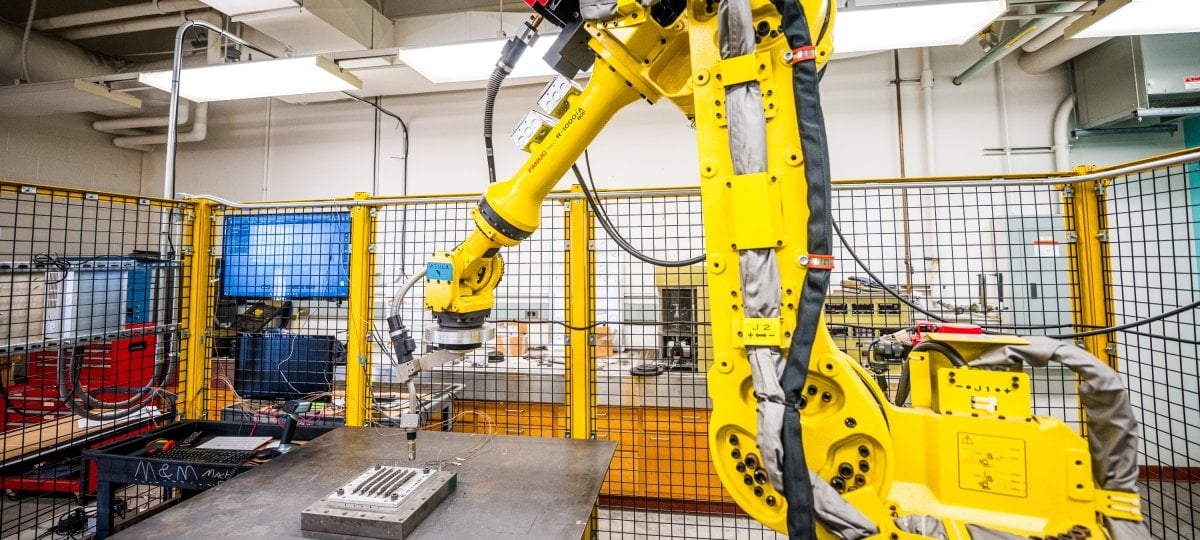Prepare for Manufacturing Engineering in Industry 4.0.
Manufacturing engineering involves the design, operation, and maintenance of integrated systems and specialized equipment. Those in the field of manufacturing engineering primarily work in plants and factories where they design solutions for various manufacturing issues. Manufacturing engineering also relies heavily on cost-benefit analyses and the use of computer-aided software to design, create, and optimize products.
Both Michigan Tech's online master's degree and PhD program, which have been designed in partnership with industry, stress manufacturing competitiveness. Manufacturing competitiveness is at the hub of smart manufacturing, modeling, simulation, sustainability, additive manufacturing, and advanced materials.
The core curriculum, inspired by Society of Manufacturing Engineer's Four Pillars of Manufacturing Knowledge is based on topics in these four crucial categories:
- Materials and manufacturing processes
- Product, tooling, and assembly engineering
- Manufacturing systems and operations
- Manufacturing competitiveness
Want to Dive Deeper Into Program Details? Watch a Recorded Info Session.
The recording is almost 50 minutes long, so if you're pressed for time, use the key below to go to the section that contains the information you need.
- Introductions: 00:01 - 6:29
- Online Manufacturing Engineering Programs (Why Choose MTU?): 6:31 - 19:01
- Program Pathways (Certificate, MS, PhD): 19:02 - 40:01
- A Peek Inside the Program: 40:02 - 45:01
- Important Next Steps and Questions: 45:02 - 49:24
Create a Degree That Aligns With Your Goals.
This online master's degree is not just for those trained in mechanical or manufacturing engineering. That is, if you're a student with a biomedical, electrical, chemical, robotics, materials science, or engineering degree, you could also benefit from a master's in manufacturing engineering, which prepares you to earn Society of Manufacturing Engineers (SME) Certifications.
Whatever your educational background, when you choose the master's route, you can personalize your program as well as collaborate with your employer to complete work-based projects.
Choose One of Three Master's Degree Options.
Students can choose between a coursework-based degree, report, or thesis. Each option comes with a different number of required courses and electives. Please note that all electives are subject to approval by advisors.
Earn a PhD in Manufacturing Engineering.
Along with a master's, MTU also offers a more advanced degree: a PhD in Manufacturing Engineering.
The doctoral degree program, which emphasizes research into the most viable and efficient processes used during fabrication, shaping, machining, and assembly, allows students to further their domain knowledge and field expertise. This innovative PhD degree cuts across traditional disciplines, such as material science, mechanical engineering, electrical engineering, robotic engineering, biomedical engineering, and chemical engineering.
Students in the manufacturing engineering PhD program focus on advancing manufacturing processes for forming, joining, casting, molding, producing composites, micromachining, and using additive methodologies.
Take One of Two Program Paths.
There are two routes in the doctoral program, which depend on what previous degree applicants have.
Important note: if applicants already have a master's degree in something other than manufacturing engineering, their transcripts are evaluated for their coursework. Because there is a minimum of 12 credits of research, they might have to take up to 18 credits of required courses if their previous master's degree does not have a significant emphasis in manufacturing.
Students can also progress from Michigan Tech's master's of manufacturing engineering to the PhD.
Explore the Curriculum For Both Programs.
All manufacturing engineering courses are delivered online both asynchronously and synchronously, so students can continue to work while pursuing their degrees. In fact, many in these programs often work part to full-time, using their current workplaces for completing program projects and for conducting both thesis and dissertation research.
Core Courses
Manufacturing Emphasis Area Electives
Regardless of what master's or PhD pathway they're on, students work with their advisors to choose their electives from four fundamental manufacturing engineering areas. In doing so, they can customize a degree that both matches their interests and meets their personal and professional goals.
- Additive Manufacturing
- Manufacturing Systems and Operations
- Advanced Materials and Manufacturing Processes
- Quality Engineering
Set Yourself Up for Career Opportunities.
Both regional and national studies have established a growing demand for manufacturing engineers and engineering managers. For instance, the 2019 NEWMA (Northeast Wisconsin Manufacturing Alliance) Needs, Skills, and Talent Survey tallied responses from over 100 major manufacturers. One of the report's main findings is that both curriculum and training programs that develop manufacturing engineers are in high demand.
In particular, industries that rely on additive manufacturing and advanced materials will have the most positive rate of change. Therefore, they will have an increased need for manufacturing engineering professionals.
Tech Markets Most In Need of Manufacturing Engineers

- Automotive
- Biomedical
- Energy
- Medical
- Packaging
- Retail
Get Started on Your Online Manufacturing MS or PhD Degree.
Both of these advanced degrees are rooted in Automation Alley, Michigan’s Industry 4.0 knowledge center. This center's ongoing mission is to help manufacturers of all sizes understand the rapid technological changes associated with digital technology in manufacturing, so that both Michigan and the nation remain globally competitive.
By enrolling in one of these programs, you can tap into Michigan Tech's rich manufacturing history while getting knowledge and expertise to confront the challenges and opportunities of Industry 4.0.
Take the next step on your educational journey at Michigan Tech. We are here to answer your questions and to help you succeed in your online degree.

